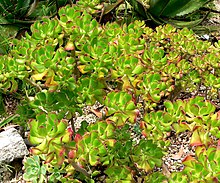| Sedum dendroideum | |
|---|---|

| |
| Sedum dendroideum at the San Francisco Botanical Garden | |
| Scientific classification | |
| Kingdom: | Plantae |
| Clade: | Tracheophytes |
| Clade: | Angiosperms |
| Clade: | Eudicots |
| Order: | Saxifragales |
| Family: | Crassulaceae |
| Genus: | Sedum |
| Species: | S. dendroideum
|
| Binomial name | |
| Sedum dendroideum | |
Sedum dendroideum, commonly known as the tree stonecrop[2] or the false hens-and-chickens, is a shrub-like perennial plant that looks much like its Sempervivum look-alike. Native to Mexico,[3] Sedum dendroideum plant thrives in warm, arid climates, as well as in cooler climates. It has been naturalized to California,[4] and Ohio.[5]
Uses[edit]
Ornamental[edit]
Due to their appearance and hardiness, like many plants in the sedum family, tree stonecrop are cultivated as garden plants. In winter, its leaves turn red.
Traditional medicine[edit]
In traditional Brazilian medicine, the fresh juice from the leaves of the tree stonecrop plant is used for the treatment of gastric and inflammatory disorders.[citation needed] In 2005, a medical research paper was released studying its uses, finding it had antinociceptive and anti-inflammatory effects in mice.[6]
References[edit]
- ^ "Sedum dendroideum Moc. & Sessé ex A. DC". Integrated Taxonomic Information System. Retrieved October 26, 2011.
- ^ USDA, NRCS (n.d.). "Sedum dendroideum". The PLANTS Database (plants.usda.gov). Greensboro, North Carolina: National Plant Data Team. Retrieved 9 November 2015.
- ^ "Sedum dendroideum". Germplasm Resources Information Network. Agricultural Research Service, United States Department of Agriculture. Retrieved 25 January 2018.
- ^ Calflora Calflora Taxon Report
- ^ United States Department of Agriculture, Sedum dendroideum Moc. & Sessé ex A. DC. tree stonecrop
- ^ Giany O. De Melo; David do C. Malvar; Frederico A. Vanderlinde; Priscilla A. Pires; Wellington S. Côrtes; Pedro Germano Filho; Michelle F. Muzitano; Carlos R. Kaiser & Sônia S. Costa (2005). "Phytochemical and pharmacological study of Sedum dendroideum leaf juice". Journal of Ethnopharmacology. 102 (2): 217–220. doi:10.1016/j.jep.2005.06.015. PMID 16054793.
External links[edit]
 Media related to Sedum dendroideum at Wikimedia Commons
Media related to Sedum dendroideum at Wikimedia Commons Data related to Sedum dendroideum at Wikispecies
Data related to Sedum dendroideum at Wikispecies- Drought Smart Plants
- Sedum dendroideum